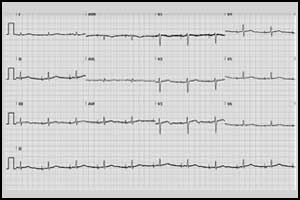- Home
- Editorial
- News
- Practice Guidelines
- Anesthesiology Guidelines
- Cancer Guidelines
- Cardiac Sciences Guidelines
- Critical Care Guidelines
- Dentistry Guidelines
- Dermatology Guidelines
- Diabetes and Endo Guidelines
- Diagnostics Guidelines
- ENT Guidelines
- Featured Practice Guidelines
- Gastroenterology Guidelines
- Geriatrics Guidelines
- Medicine Guidelines
- Nephrology Guidelines
- Neurosciences Guidelines
- Obs and Gynae Guidelines
- Ophthalmology Guidelines
- Orthopaedics Guidelines
- Paediatrics Guidelines
- Psychiatry Guidelines
- Pulmonology Guidelines
- Radiology Guidelines
- Surgery Guidelines
- Urology Guidelines
A case presenting with recurrent syncope during sexual activity

The present case paper appears in the European Heart Journal - Case Reports, where the authors Henk-Jan Boiten and associates report an orgasm-induced torsades de pointes (TdP) in a patient with LQT (long-QT) syndrome type 2 with a novel mutation in the KCNH2 gene. Orgasm-induced torsades des points, although extremely rare, could be the first symptom in a patient with long-QT (LQT) syndrome type 2.
Congenital long-QT (LQT) syndrome can lead to torsades de pointes (TdP), which can deteriorate into ventricular fibrillation resulting in sudden death. Till now more than 16 genes have been linked to the LQT syndrome.
A 24-year-old Caucasian woman with a medical history of depression, no medication use and no family history of sudden death, presented with recurrent syncope during sexual activity. Immediately after achieving orgasm during sexual intercourse she lost consciousness. Baseline 12-lead electrocardiogram revealed a wide-based T-wave with a prolonged QTc-interval of 507 ms. During hospital admission runs of TdP were recorded. The patient was treated with magnesium, an oral beta-blocker, and an implantable cardioverter-defibrillator. Genetic testing (Sanger sequencing) revealed a novel mutation (c.361del) in the KCNH2 gene (chromosome 7q36).
To date, orgasm-induced TdP as the first symptom in a patient with LQT2 has not been published previously. The high levels of sympathetic adrenal hormones during orgasm may explain the timing of the TdP in this patient. The patient has remained free of syncope at 6 months of follow-up.
For more details click on the link: doi.org/10.1093/ehjcr/yty062

Disclaimer: This site is primarily intended for healthcare professionals. Any content/information on this website does not replace the advice of medical and/or health professionals and should not be construed as medical/diagnostic advice/endorsement or prescription. Use of this site is subject to our terms of use, privacy policy, advertisement policy. © 2020 Minerva Medical Treatment Pvt Ltd